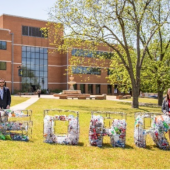
Abstract: Southern Arkansas University has developed the SOAR Sustainability Conference to spotlight current sustainability-related efforts. SOAR, representing the southern Arkansas region, was added to the conference name to signify the area of emphasis for the event. This spring conference event has been held in April of 2022 and 2023. The 2023 conference included over 50 presenters from academia, private businesses, government agencies, and volunteer organizations. Session topics were aligned with the critical components of sustainability education including anticipatory thinking, empathy, change of perspective, justice, responsibility, and ethics. Surveys were distributed to SOAR conference attendees to gauge their level of attitudes, knowledge, and behavior regarding sustainability issues. Responses were very positive overall, showing gains in attendees’ attitudes, knowledge, and behavior between 2022 and 2023. The behavior category showed the largest annual increase while knowledge gains over the same period were lower. Overall, the SOAR Sustainability Conference has shown success in engaging students and community stakeholders to take part in this effort to address sustainability-related challenges in the area.
Continue Reading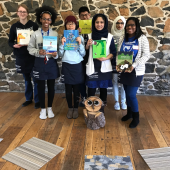
Abstract: A partnership between a university and local arboretum was expanded to include the campus library as a collaborator. Instead of having sustainability-themed programming between the two institutions focus on just the environmental components of the Sustainable Development Goals (SDGs), a library brings attention to literacy and information access across all aspects of the partnership. We share two public programs held between our university and an arboretum with strong involvement by the library in the development and execution stages, thereby increasing the connections across the SDGs and progress towards the 2030 agenda.
Continue Reading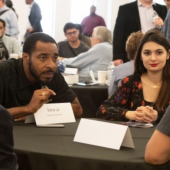
Abstract: A course in sustainability was implemented at the University of Houston-Downtown (UHD). The course was open to all students at UHD with a goal of teaching sustainability as the complex interaction of multiple fields (economics, social science and environmental science). UHD’s Center for Public Deliberation (CPD) was interested in applying the concepts of public deliberation into courses outside of communication. For effective public deliberation, students need to learn the skills of soliciting and incorporating diverse opinions as a pre-requisite of working together toward a solution. Many students attracted to sustainability, including science and technology majors, do not realize that most problems of sustainability are not merely technical problems but problems that arise from conflicting ethical frameworks. Students outside of public deliberation rarely have an opportunity to practice engaging in the tools that will be critical for them to develop solutions within the complexity of current social systems. We review the value of public deliberation in higher education and the logistics of bringing public deliberation into a sustainability course. We summarize the logistics of the collaboration with a focus on deliberation, planning and action in a semester-long group projects with a focus on creating healthier communities. We report on the impacts of both the communication and science faculty and the survey data from students. Finally, we discuss the value of such a collaboration in sustainability education.
Continue Reading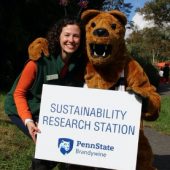
Abstract: In Fall 2017, Penn State Brandywine kicked off an initiative titled Sustainovation, emphasizing programming and community collaborations through sustainability and innovation. The campus identified Tyler Arboretum as a community partner to work with to assist in advancing their education and outreach goals. Students from across the campus came together at the beginning of the semester for an initial meeting to be introduced to the United Nations Sustainable Development Goals (SDGs), to meet the community partner and to hear about the semester project of adding sustainability education to the arboretum’s fall festival Pumpkin Days. In addition, a validated survey from Biasutti & Frate (2017) was given to the students to define their attitudes towards sustainable development before working with this partner and the project. The survey addresses four sustainability constructs of Environment, Economy, Society, and Education. At the end of the semester, the same survey was given to student participants in this Sustainovation project for Tyler Arboretum. Aggregate data show that there is a statistically significant difference in student attitudes at a minimum 90% confidence level (t-test) for eight of the twenty survey statements in the constructs of Environment, Economy, and Society.
Continue Reading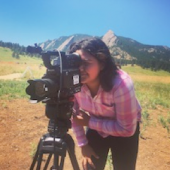
Here we describe how science learning can be enhanced through filmmaking. Combining the creative process of film production and its engaging storytelling and artistic components with science learning allows students to take ownership over their learning process and makes science accessible to learners who might not be reached through traditional science classrooms. We describe a model in which students develop a short film that investigates how climate and environmental change impacts their lives and their communities. Students are guided by college student mentors or teachers through a five-step program that includes: (1) selection and research of their topic, (2) development of a storyboard and script, (3) filming, (4) editing, and (5) a capstone screening event showcasing the final film. Through this process, students deepen their understanding of climate science and its complexity, while increasing their appreciation of the impacts of climate on society. Students also gain exposure to science and technology careers, while gaining confidence in their ability to complete a project.
Continue Reading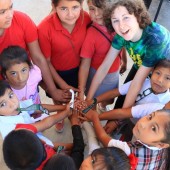
Imagine a world where people hold the highest standards for collaboration, understanding, and mutual respect. Imagine a world where people are engaged and hold a deep commitment to creating genuine, just, and mutually-empowering beneficial relationships. Imagine a world where people have the ability to connect across cultures, appreciate, and deeply listen to different perspectives, understand complex systems – and how we all fit into them – and together co-create solutions to the most daunting of global challenges. Imagine a community of people bringing forward energy and a sense of possibility, and stepping up to create the world we want to live in.
Continue Reading
Abstract: Healing a world on the brink of eco-social collapse requires an understanding of how planetary health has declined, how sustainable societies worked before, and how we can restore them. Global colonizing processes established a worldview of economic domination and competition that has had detrimental impacts upon our social and environmental systems. Archeological and mathematical studies of the rise and fall of human civilizations concluded that egalitarian societies with low environmental exploitation were the longest lasting in human history, and that high economic stratification, and/or overexploitation of resources were precursors to societal collapse. Indigenous community systems were relatively egalitarian and environmentally sustainable. Hypothetically, if we use Indigenous eco-social systems as a guide for community planning, then eco-social collapse can be averted, and eco-social resilience and sustainability can be restored. A framework of Indigenous principles and practices is included, with examples of goals, activities and indicators.
Continue Reading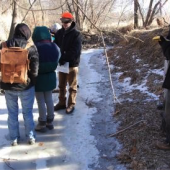
This case study describes a problem-based and service learning module in which undergraduate students participated in a community-based project. Students joined a group consisting of local non-governmental organizations (NGOs), public and private organizations, concerned citizens, and city officials to tackle issues concerning the local watershed. The case study took place over a number of years from 2014 to 2016 and will continue in subsequent academic years with a new group of multidisciplinary students.
Students put together documentation for a grant application that resulted in the city receiving $2.5 million dollars in grant money towards sustainable stormwater management systems. This aspect of the project included extensive data collection and analysis, much like the kind of work water conservationist in the field would perform. Students continued the work by using the data to plan and design appropriate, site-specific best management practices (BMPs) for the campus and in subsequent courses will implement these designs on site.
The mode of instruction described in this case study proved quite engaging to the students because it put them in the heart of an actual local project, doing work that was removed from a purely academic exercise – thereby offering a real-world scenario as field employees. The goal is to provide hands-on instruction that inspires and engages students and allows them to apply concepts of watershed management as a service to their local community.
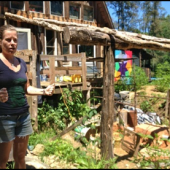
Place can be understood as space endowed with meaning, evoking notions of difference, connection, attachment, and emotion. As processes of modernity and globalization have increasingly homogenized cultural and natural landscapes, place is said to be ‘thinning’ or lost, linked to widening rifts between social and natural worlds. Such homogenization globally has sparked concerns, as people perceive landscape loss and increasing socio-ecological injustices. One such system of homogenization and unsustainability is industrial agriculture, a system that has shifted smaller scale, place-based, and diverse food systems to a global, mechanized one, distancing production from consumption, disrupting communities, and obscuring awareness, understanding, and care.
Yet, as consumer awareness increases and people desire to know where their food comes from and who produced it, inclusive place-based food systems can provide reconnections amongst producers, consumers, community, and the more-than-human world. In this paper, stemming from research in western North Carolina, we bring together literature from scholars of place, agro-food studies, education, and tourism to investigate the role of place in local food systems as well as the potential of small-scale sustainable agricultural places to serve as important educational spaces via community-based farm tourism. To better understand such potential, we draw on a study of the Blue Ridge Women in Agriculture High Country Farm Tour, an annual tour of small-scale sustainable working farms in the North Carolina High Country. Delving into participating producers’ philosophies, practices, and stories reveals passionate sustainable producers firmly rooted in place, while exploring consumer motivations for and impacts of participation makes a strong case for community-based farm tourism and other environmental tourism projects as an avenue for place-based education, community socio-ecological resilience, and sustainability across scales.
Continue Reading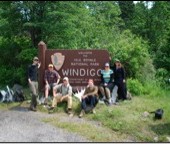
Abstract: For five years we taught a field philosophy course in Isle Royale National Park to study if and how wilderness experience, coupled with a care-based and community-focused curriculum in place-based ecology and environmental ethics, could help students develop empathy for nonhuman nature. Empathy for the natural world can positively impact environmental attitudes and behaviors; empathy also plays an important role in citizenship skills and actions. Using a constructivist grounded theory qualitative analysis of student pre-, on-, and post-course writing, we found that students consistently demonstrated shifts in empathetic awareness and individual agency all years but one, when the course size was larger. Several factors impacted the development of an empowered sense of self and moral agency, including: the use of narrative and storytelling in the curriculum, the inclusion of student-driven choice-based assignments, and group size. Experiential environmental learning focused on the development of empathy can provide a meaningful path for students to bridge moral agency, environmental attitudes and knowledge, and citizenship skills and behavior so they can connect their values with action These results have consequential impacts for sustainability learning and action.
Continue Reading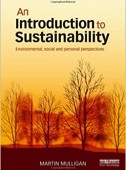
Abstract: Martin Mulligan’s An Introduction to Sustainability: Environmental, social and personal perspectives reviews the history of sustainability science, placing emphasis on the social-ecological model. This model introduces the importance of personal values and choices. He discusses topics around four themes: limits to growth, diversity, community and resilience. It is well-written, informative and novel.
Mulligan, M. (2014). An Introduction to Sustainability: Environmental, Social and Personal Perspectives. New York: Routledge. ISBN-13: 978-0415706445
Continue Reading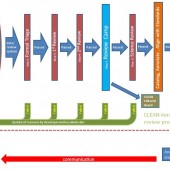
Recent changes in the climate system are mostly due to greenhouse gas emissions through increased energy use by society, which changes the distribution of energy in the Earth system. These changes highlight the importance of energy education. Energy consumption is at the source of and the solution to climate change. However, studies across the US and globally show that students’ understanding of energy and the connection between energy and climate is low. The Climate Literacy and Energy Awareness (CLEAN, http://cleanet.org) effort supports educators of middle school through undergraduate levels in their teaching about energy topics by providing an online, free collection of peer-reviewed, classroom ready resources that span the entire breadth of energy and climate education. The web portal also provides materials for teachers to learn more about how to teach about energy and climate. A vibrant community supports educators and other stakeholders in their efforts.
Continue Reading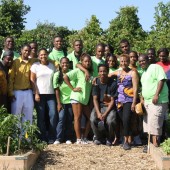
This case study describes the Cook County Green Corps program, a green job training program serving African American young adults from a low-income neighborhood. The program was implemented by an interdisciplinary organizing team to build knowledge, skills, and participation in sustainable jobs and urban agriculture among young adults. The trainees’ experience was documented by a program evaluation survey, environmental knowledge survey, and 1 year reflection interview. We summarize the experiential design, implementation and evaluation of the program. We discuss the limitations and the benefits of the program for trainees and the neighborhood. We share recommendations for future green job training programs that can best serve urban neighborhoods.
Continue ReadingPDF:SmithSpring2014 Key words: Sustainability Education, state of the field, place, community, problem-solving, action When trying to consolidate my thinking about sustainability education in preparation for a talk a few years ago, I asked myself two questions: What is sustainability? And what kinds of people seem most likely to help humanity move in that […]
Continue ReadingPDF: Jaimie Cloud JSE May 2014 “The test of a first-rate intelligence is the ability to hold two opposing ideas in mind at the same time and still retain the ability to function. One should, for example, be able to see that things are hopeless yet be determined to make them otherwise.” F. Scott Fitzgerald […]
Continue Reading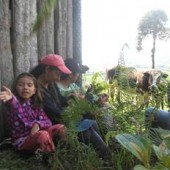
PDF: Kassam&AveryJSESpring2013 The Oikos of Rural Children[1]: A Lesson for the Adults in Experiential Education Karim-Aly S. Kassam, Department of Natural Resources & American Indian Program, College of Agriculture and Life Sciences, Cornell UniversityLeanne M. Avery, Department of Elementary Education and Reading, State University of New York College at Oneonta […]
Continue Reading
Timothy Clayton looks at the internal workings of NPO’s (New Paradigm Organizations) to see how they might respond to the experiences of operating in a world structured by capitalism and traditional business practices. His insights produce an impressive and thoughtful list of ways in which some NPO’s, despite a flashy mission statement, might not practice what they preach, and can fall into traditional modes of operation.
This essay explores the challenges facing organizations intent on fostering peace, justice, and sustainability when incorporating traditional business practices into their operational modeling. The implications of these practices on internal organizational community conditions are examined, as are the possible impacts on mission-intended transformational capacities.
Continue Reading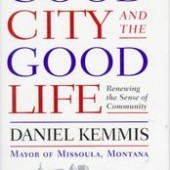
In this revealing interview, Daniel Kemmis shows how he has brought sustainability issues into play as mayor of Missoula Montana and as a leading state legislator in Montana. So often, ideas remain in the abstract, but Daniel Kemmis’ experience shows the reality of how they can be brought into the political realm, along with all its imperfections. He brings weight to the call to “act locally.”
Continue Reading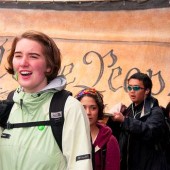
Riki Ott uses “ultimate civics” to inspire students to take action and make a change. Here, she puts forth the foundation for her curriculum that brings students out of the classroom and into the political arena, with the goal of eliminating our addiction to petroleum.
Continue Reading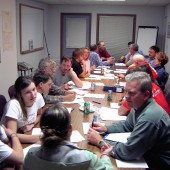
Greg Smith shows us, through his numerous interesting real-life educational stories, how place- and community-based education can bring a true spirit of opportunity to public school students. He argues that true sustainability will come about through local efforts of the current generation of students to guide and form our future.
Continue Reading